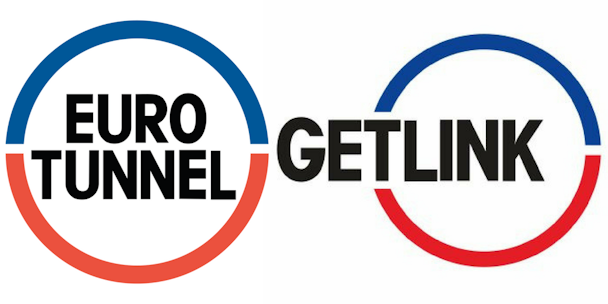Eurotunnel to Getlink: why brand names need spirit, not logic
This week the operator of the Channel Tunnel, Groupe Eurotunnel, announced it is changing its name to “reflect the dynamism of connection and change”. The new title it’s chosen is Getlink.

Old and new Eurotunnel logos
Does this actually matter?
Organisations don’t build reputation on company or product name alone. A name is rarely encountered in isolation and a good one won’t save a misconceived or badly executed idea.
That said, a strong name can’t be underestimated. It’s a tool in a bigger armoury, but a crucial one. It opens the conversation with a customer, sets expectations around an experience, and hangs around every interaction thereafter. Would Google, Nike and Pepsi have made it under their original monikers, BackRub, Blue Ribbon Sports and Brad’s Drink?
I’ve worked in naming for over a decade, and can safely say it’s one of the hardest parts of a brand consultant’s job. There are cultural sensitivities to check if you’re setting sights beyond a domestic market, and names are subject to trends. Most recently, for example, proprietary names – compounds like Facebook and inventions like Skype – have been popular. That’s mainly because they’re easiest to register and protect at a time when most options are already owned.
Naming’s a surprisingly personal thing and change comes with risk. Royal Mail Group’s short-lived predecessor, Consignia, is testament to that. But change can be necessary. It can help a business reset after a merger or acquisition, create distance from past scandal, make sense of a portfolio that’s grown organically, make room for diversification, or mark a change in emphasis and future direction.
In the case of Getlink, there are a couple of things going on.
The company operates four brands (Eurotunnel, rail freight operator Europorte, electricity connection ElecLink, and railway training centre Ciffco). Presumably it was after an umbrella company name that made more sense in the context. On top of this, Jacques Gounon, chairman and chief executive of the company, has talked about “an exciting new era for mobility infrastructures”. There’s a new sense of breadth and energy in his agenda.
The solution, developed internally, feels relatively sensible. Safety engineering has undeniable upsides as a strategy, especially given the political context.
It has some logic too. It’s derived from the company’s code on the stock exchange (GET), which it will retain, so that part is nice and neat. With my linguist hat on, I’d say clipped vowels and obstruent consonants make it sound strong, capable and efficient – all helpful qualities in this sector.
But logic’s also the problem.
Partly because it’s not entirely solid. Why ElecLink but Getlink, without the capital in the middle? Won’t Eurotunnel still be confused with Eurostar, a totally separate entity? How do the four brands relate to each other, from a customer’s perspective? And if this is ‘Anglo-Saxonizing for a post-Brexit world’ as some commentators have suggested (which by the way makes me horribly sad), why are the brands still distinctly continental? I don’t buy it.
Sewing up the logic isn’t the solution. For an organisation at the forefront of rapid and hugely exciting change in the mobility space, with the potential to reach a customer base of over 20 million people and attract the brightest talent in the industry, I’d like more pizazz. I’d like a sense of the company’s ambition and the attitude that drives it, so I can start to feel the emotion in all of this. More spirit, less subtlety please.
Jemma Elliot is global head of content at branding agency Wolff Olins.
